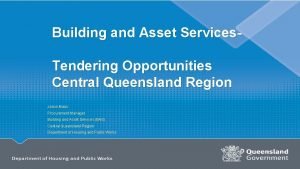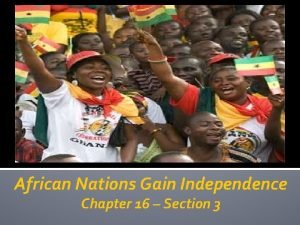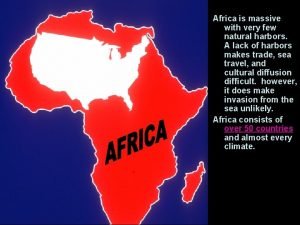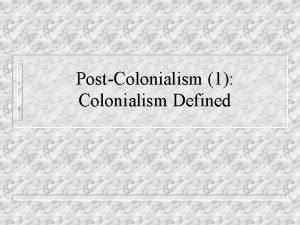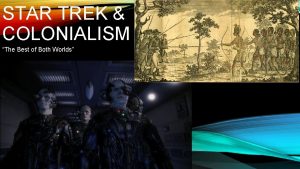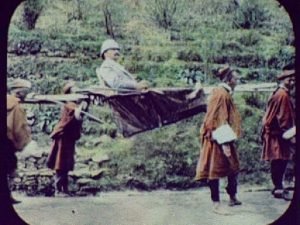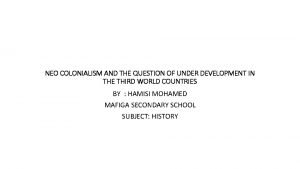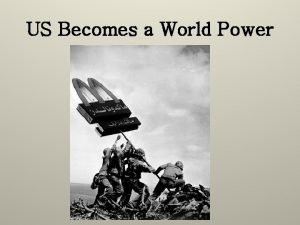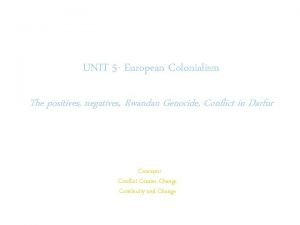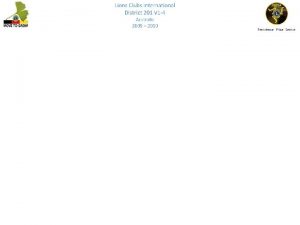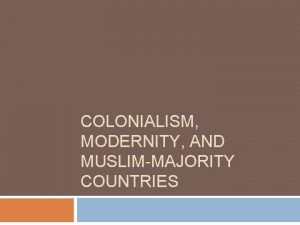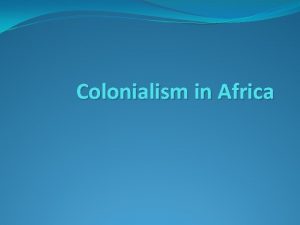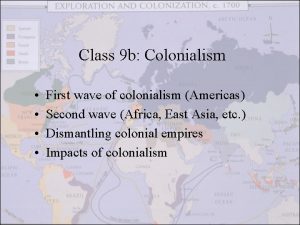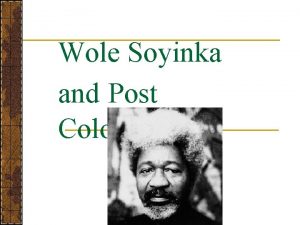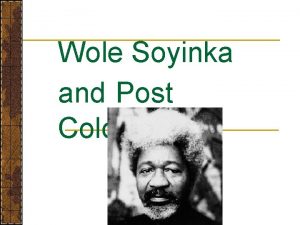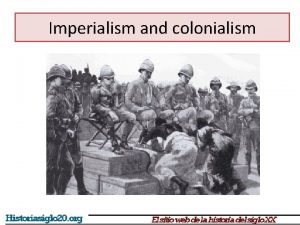Dismantling Colonialism African Independence Until lions tell their























- Slides: 23

Dismantling Colonialism -- African Independence Until lions tell their tale, the story of the hunt will always glorify the hunter -African proverb

African Response • Despite the unpopularity of colonial rule, many Africans had to initially accept the authority of the colonial state • some collaborated for special privileges, and/or having access to medical help, and educational and or business opportunities. • some African people even saw colonization as progressive and civilizing. But for many African leaders, elders and families the feelings of discontent with colonial oppression did arise …

During colonial rule • Africans expressed many forms of resistance to European rule The two most common responses to colonialism were to … • actively fight back either through a forming a movement of resistance that might have culminated in organized rebellions Or • They strove to form political organizations with the hopes to join legislative bodies and create laws for improved human rights and eventual freedom and independence for native Africans. Many Organizations were formed to protest various elements of colonial rule

“I shall call upon you my fellow women. We will fight the white men. We will fight until the last of us falls in the battlefield. " Often women led efforts of resistance • Yaa Asantewaa was an Ashanti queen who led an armed resistance to the colonization of Ghana by the British. She succeeded in the short run, but the Ashanti were heavily outgunned. Yaa Asantewaa

Colonial masters took control and stole natural resources for economic gain Many Africans caught on to the exploitation • Jaja was a chieftain at the time Nigeria was colonized • he fought against the British because of what he considered the many injustices that occurred in his dominion. • The colonial master's robbed farmers and stole the resources of the land he, as chief was openly against this. In the end, he was caught by colonial officers and exiled from the region he once served. Chief Jaja (Nigeria)

Key forces that led to African Nationalism • Missionary education created leaders through education, and provided a moral process of thinking that led to further questioning of African’s basic human rights • World Wars I and II weakened Europe, and thus their hold on Africa. • The ideology of Pan-Africanism from black leaders in the U. S. and the Caribbean provided global networks of support • The League of Nations/The United Nations challenged the practice of colonization, AND suggested it was better to support regions to eventually rule themselves.

Missionary schools -education • Fostering intellectual development which then was used to fight for freedom Missionaries unfortunately displayed the disparities and contradictions • Taught a Christian doctrine that taught Africans to “expect equal and fair treatment” • But often fell short of delivering…by failing to challenge or by promoting the colonial officers’ agenda.

WWI and WWII • Africans were drafted to serve in both wars The British enlisted more than 700, 000 Africans to fight in their armies. • Irony: using “unfree” Africans to fight for freedom against German imperialism • Africans learned modern military skills, leadership, and what it meant to fight for freedom. Also, saw how limited the Europeans were with their power.

Aftermath of WWII • Economic conditions for Europe deteriorated • Became to expensive to maintain off shore colonies • And had a more difficult time upholding a resistance to suppress the nationalists movements • France and Britain looked for ways for a “honorable exit” from Africa.

A small group of educated Africans concerned with… • gaining full rights, mostly for educated Africans • More power in representative political bodies • Widen the scope of Africans in the political process

Following the conclusion of the Second World War (WWII) • Nationalist and Independence Movements in Africa increased • the departure of colonial governments from Africa occurred during the 20 th century (1900 s). • most of them occurring in the 1960 s but continuing into the 1970 s all the way up to South Africa’s liberation from white minority rule in 1994.

The Journey to Independence • Various regions in Africa gained Independence over time, with the largest emergence of independent efforts occurring in the 1960 s. • Some gained independence via social movements, leading to orderly transitions away from European rule. • But many leaders had to demand independence; they had to “agitate” for it. • some independence movements were more prolonged and violent i. e. , guerilla warfare, and decades of armed struggle

In British West Africa (Ghana and Nigeria) • African leaders sought to improve their position through constitutional means • Petition for more representation on legislative councils • Tried to reduce the presence of “Indirect Rule” via chiefs appointed by colonial administrative officials. • Educated elites and chiefs were not always in conflict, because of kinship ties and some chiefs were also highly educated.

Other efforts working toward freedom • Railway workers organized trade unions, cocoa farmer and other actions to protest low prices for crops. • Market women in Nigeria, rioted to protest high taxes and harassment of colonial administrators • In rural areas, tax evasion was widespread • Other resisted voting by moving to live in other colonial states

Key events leading up to independence in Ghana • Chiefs and village people often tried to resist the policies of British rule • There were multiple wars between the colonial powers and ethnic groups – that occurred during colonization period • Processes of Decolonization intensified after WWII

Key events towards Independence • United Gold Coast Convention (UGCC)-called for self-governance • 1948 rioting increased – • members of UGCC were arrested including, an important leader, Kwame Nkrumah • Later, by 1949 Kwame Nkrumah formed his own party The Convention People’s Party (CPP)

Nkrumah Promoted a Positive Action Campaign • Because of his leadership and a series of boycotts, strikes and civil disobedience Nkrumah was imprisoned • After his CPP party gained majority seats in the legislative assembly Nkrumah was released and appointed leader of government business

Ghana obtained independence in 1957/58 • Through further negotiations with Britain • Became the Republic of Ghana (named after an ancient Islamic empire in the southwest Sahel region) • First president: Kwame Nkrumah; Founding member of the Organization of African Unity (OAU)

Key events leading up to Nigeria’s independence • Following WWI demands for independence and Nigerian nationalism grew • Successive constitutions were legislated by the British Government leading to a loose federation of selfgoverning states • 1954 a federal system of government was created

Nigeria was granted full independence in October 1960 • a federation of three regions – Northern, Western, and Eastern • Prime minister Sir Abubakar Tafawa Balewa leading a coalition government of conservative parties • Cultural and political differences amidst the groups created sharp tensions • Nigerian Peoples Congress (NPC)-(Northerners and Islamic Faith) • National Council of Nigeria and the Cameroons (NCNC)-Igbo (Easterners and Christian dominated) Led by the Governor General: Nnamdi Azikiwe • Opposition held by liberal section, Action Group (AG) (Westerners and Yoruba ethnic group)

1963 The Federal Republic of Nigeria Nnamdi Azikiwe governor general 1960 • Southern Cameroon opted to join the Republic of Cameroon • Northern Cameroon chose to stay with Nigeria • Nation parted with Britain’s influence completely in 1963 • Held elections • In October 1963, Nigeria proclaimed itself a federal republic, Nnamdi Azikiwe 1 st president

watch • Africa: States of Independence – the Scramble for Africa • http: //www. youtube. com/watch? v=Lb. T 44 Hwz. Nr. I • 44: 54 min. (advance to 23. 36 min. African nationalism & Independence), (go to 33. 38 min. for conditions of post-independence • See the video African students from ISU comment on the economy in their countries. 12: 57 mins • https: //www. youtube. com/watch? v=GE-B-Tiyd 6 s

AFRICA A Voyage of Discovery in HD: • The Rise of African nationalism • https: //www. youtube. com/watch? v=EUsgu 32 zu. Z 0
 Until lions have their historians
Until lions have their historians Raise and rise again until lambs become lions
Raise and rise again until lambs become lions A union b example
A union b example Until lambs become lions
Until lambs become lions Rise and rise again until lambs become lions
Rise and rise again until lambs become lions Hand tools and their uses with pictures
Hand tools and their uses with pictures Queensland building tenders
Queensland building tenders African nations gain independence
African nations gain independence Pan-african movement stamp
Pan-african movement stamp African independence movements
African independence movements First african nation to gain independence
First african nation to gain independence Skill 18 base form verbs after modals
Skill 18 base form verbs after modals What were the causes of imperialism
What were the causes of imperialism Example of colonialism
Example of colonialism Star trek colonialism
Star trek colonialism Electronic colonialism theory
Electronic colonialism theory First wave colonialism
First wave colonialism What is post colonialism
What is post colonialism Impact of neo colonialism on third world countries
Impact of neo colonialism on third world countries Colonialism thesis statement
Colonialism thesis statement Colonialism vs imperialism venn diagram
Colonialism vs imperialism venn diagram How are colonialism and imperialism different
How are colonialism and imperialism different Negatives of colonialism
Negatives of colonialism Key terms in postcolonial theory
Key terms in postcolonial theory






